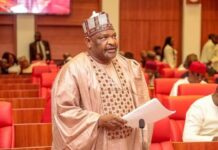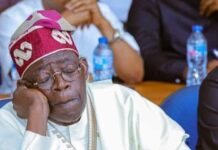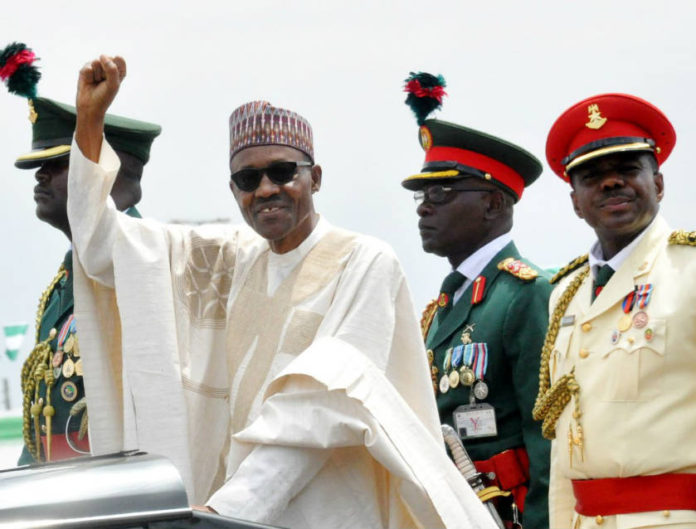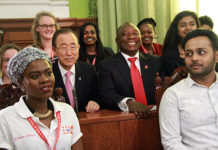I sometimes wonder what President Buhari thinks of politics and of politicians. I suspect he hates both. But then, he is a politician with about fourteen years of active partisan politics on his curriculum vitae, so the point cannot really be that he hates what he has been doing for one-and-a-half decades. My sense is that he is able to play politics by standing over and above the run of the mill politician. This means cultivating high values about integrity and engaging in the process with the zeal of dealing with all these corrupt politicians who have been messing up our society for so long. We first saw the zeal when he came into power as a military General on first of January 1984.
On coming to power, the Buhari military administration arrested and detained 475 leading politicians in the country and established five military tribunals to try them. The tribunals had five members – four military officers and one civilian judge each. The tribunals were prosecutor, judge and jury and the accused were assumed to be guilty except if they could prove their innocence. Virtually the entire political class was jailed for between 20 and 200 years each. I suspect precisely for this reason, many Nigerians worked hard for the return of Buhari to power and now we have him. As Buhari himself explained in a recent interview, General Babangida and others conspired to remove him when he directed his lenses at military politicians who were as corrupt as the civilian politicians. He did not do what he needed to do at that time to sustain his tenure. Today, my question is whether he is currently playing the politics he needs to engage in to sustain his government from the current political class that established the APC believing that politicians can now do business with him.
The Buhari conception of power is cleansing the political arena of the corrupt, vile and self-serving persons who tend to dominate and replacing their dirty politics with a return to providing for the public good. Nigerians voted for Buhari precisely because that was the change they wanted. Change however requires time and sustaining the longevity of the regime is critical for ensuring that he arrives at the end game. This requires that he practice a type of politics that would work for the end game – sustaining his political coalition and indeed expanding it, keeping public confidence that he is on the right track and ensuring that his political constituency does not betray him as they did in 1985, when the army high command betrayed him. In other words, in addition to producing the dividends of democracy to the people, he must keep the loyalty of his political coalition. Delivery on the first point is proving to be very difficult and I doubt that he is making any efforts on the second point.
Of course Buhari is lucky to have charisma and the thinking might be that his charisma could carry him to the Promised Land. Max Weber tells us that charisma is the authority of the extraordinary and personal gift of grace that breeds absolutely personal devotion and personal confidence in followers. History is however replete with examples in which charisma fails because there is no political machine or process to sustain it. The problem with Buhari is that his charisma actually has geographical limits and what produced victory in 2015 is not the charisma of his base which he sustained for a long time but extending his political support to areas where he had limited charisma. In thinking about sustaining his regime beyond 2019, keeping that alliance together is of crucial importance.
The first issue is keeping the large coterie of ‘professional politicians’ who worked hard, invested resources and mobilised to get him into power happy. Weber reminds us that we may all engage in politics, and hence seek to influence the distribution of power within and between political structures, as ‘occasional’ politicians by voting or engaging in other forms of political activity. The reality on the ground however is that it is the professionals who take politics as a vacation that do the heavy lifting of financing the process, mass mobilisation, strategy development and implementation. For Weber, there are two ways of making politics one’s vocation: “Either one lives ‘for’ politics or one lives ‘off’ politics. He however adds that in reality, politicians tend to do both – he who lives ‘for’ politics also lives ‘off’ politics, as their vocation also becomes their means of livelihood. It is for this reason that professional politicians expect to get political and other types of appointments after the victory of their party in elections. In a surprising development, no one has drawn President Buhari’s attention to the fact that there are a lot of professional politicians who worked hard for his victory and success that are patiently waiting for appointments as we approach 50 percent of his tenure. It might well be that President Buhari believes that all politicians should only live for politics but the reality is that political machines have to be serviced. If the position of the president is that he does not trust the set of politicians he worked with to get into power, then he has to nurture a new set that is in line with his thought processes. He does not appear to be doing that either. The total absence of political engagement is often a pathway to political oblivion.
Political parties exist to nurture their governments about the best ways of sustaining the power they have gained. One problem however appears to have been that the All Progressives Congress (APC) went to sleep immediately after winning the 2015 elections. It has not held a meeting of its National Executive Council since the elections. The presence of its members in government is limited and most boards have not been constituted. The scandal is that the APC appears too frightened of the president to even complain of its marginalisation. Between March and June this year, there were speculations that the problem was the weakness of party chairman, Chief John Odigie-Oyegun. A NEC meeting was called to address the issue and absolutely nothing was discussed at the meeting. Next year, serious politicking for the 2019 elections will gather steam and the APC may find itself in trouble. In fact the only reason they have had it easy is that the opposition PDP has been in total disarray and therefore unable to play its role.
APC has had great difficulties playing the politics of governance. It was unable to impact on the choice of the leadership of the National Assembly. It has been unable to manage and resolve the lingering tussle for the chairmanship of its Board of Trustees (BoT) involving two party heavyweights, former vice president, Atiku Abubakar and former Lagos governor, Asiwaju Bola Ahmed Tinubu. The process of getting members into boards failed following revelations that bribes were being solicited for juicy board appointments. The legacy parties that established the APC – Congress for Progressive Change (CPC), Action Congress of Nigeria (ACN), All Nigeria Peoples Party (ANPP) and the new Peoples Democratic Party (nPDP) caucus that entered are unable to resolve their relative strengths and working relationships. The problem is that inertia and non-action simply does not work in politics. Neither the president nor the APC is playing any politics. If the political forces lose hope in their party, they will continue their professional political life in other structures and surprises maybe en route.



























